北师大版(2019)高中英语必修第二册 Unit6The admirable Lesson 2 History Makers 精品课件(共26张PPT)
文档属性
| 名称 | 北师大版(2019)高中英语必修第二册 Unit6The admirable Lesson 2 History Makers 精品课件(共26张PPT) | 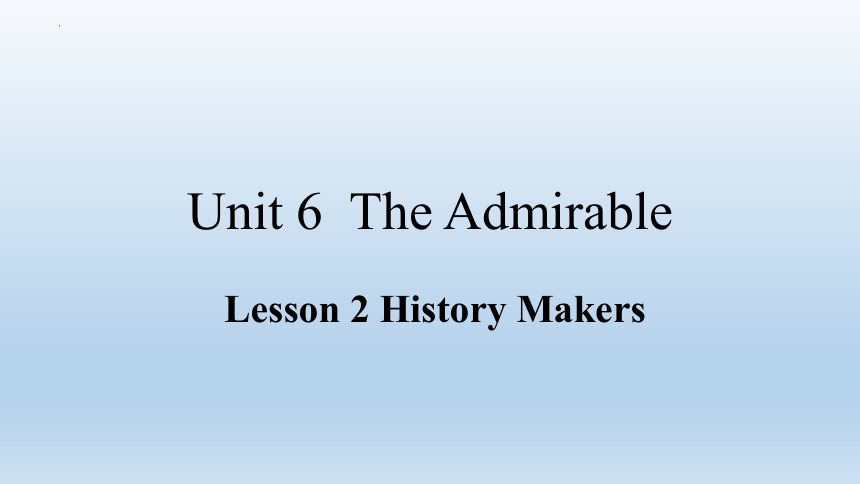 | |
| 格式 | pptx | ||
| 文件大小 | 65.3MB | ||
| 资源类型 | 教案 | ||
| 版本资源 | 北师大版(2019) | ||
| 科目 | 英语 | ||
| 更新时间 | 2023-03-07 18:16:07 | ||
图片预览

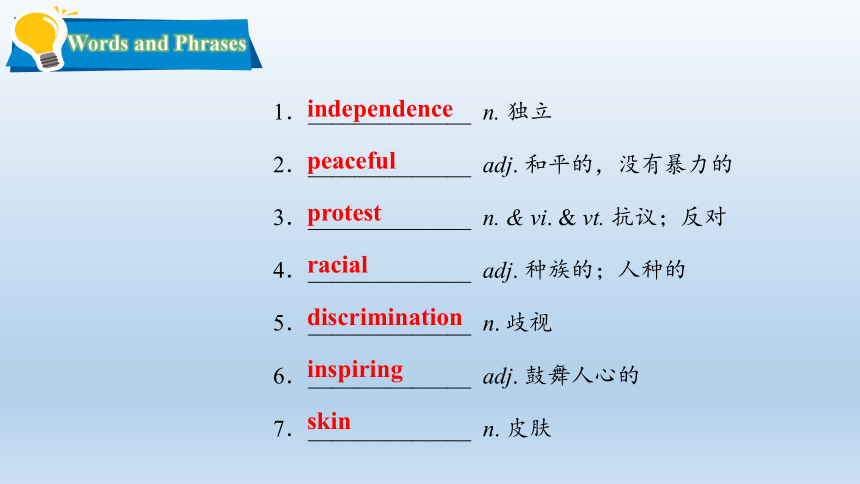
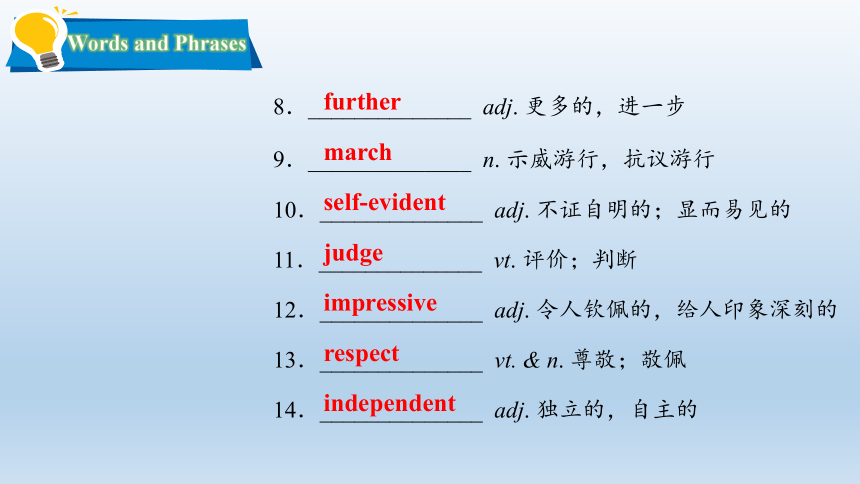
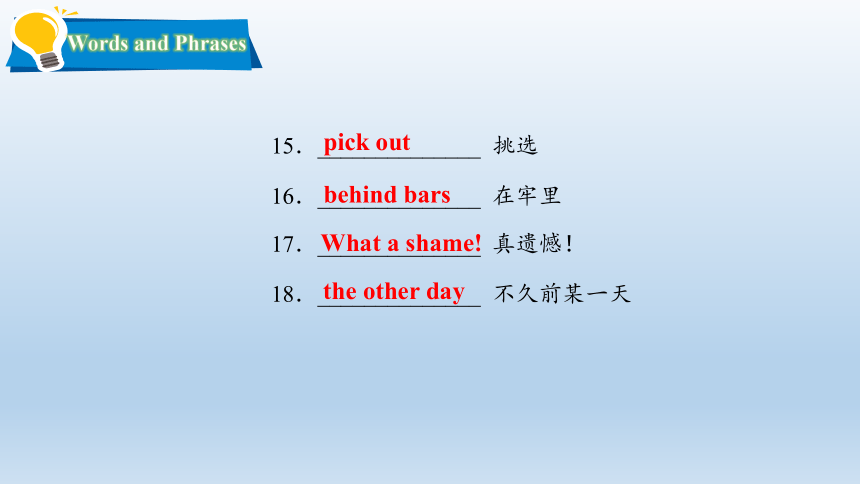

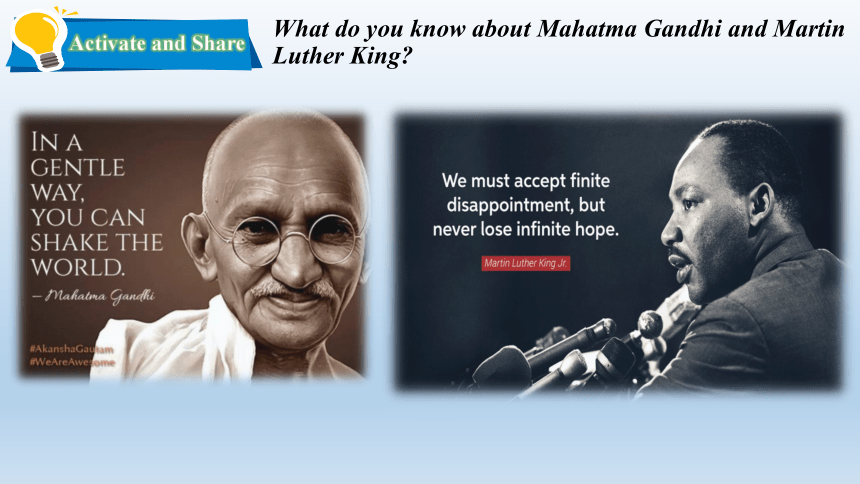
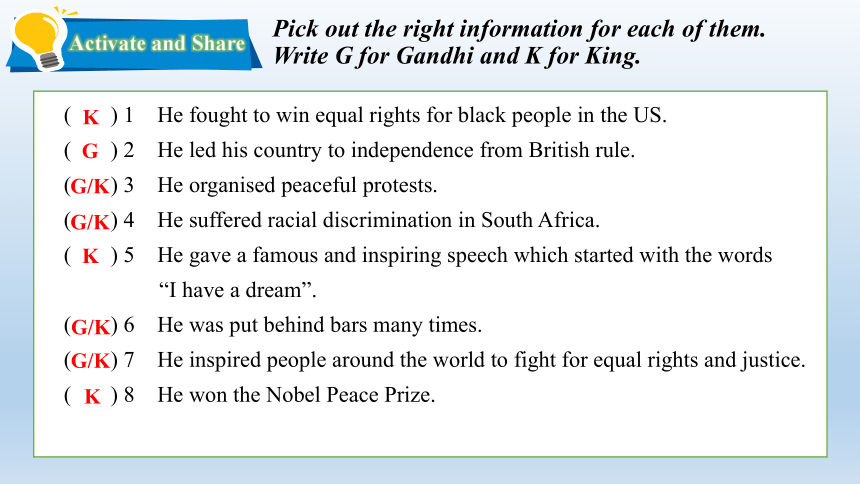


文档简介
(共26张PPT)
Unit 6 The Admirable
Lesson 2 History Makers
Words and Phrases
1.______________ n. 独立
2.______________ adj. 和平的,没有暴力的
3.______________ n. & vi. & vt. 抗议;反对
4.______________ adj. 种族的;人种的
5.______________ n. 歧视
6.______________ adj. 鼓舞人心的
7.______________ n. 皮肤
independence
peaceful
protest
racial
discrimination
inspiring
skin
Words and Phrases
8.______________ adj. 更多的,进一步
9.______________ n. 示威游行,抗议游行
10.______________ adj. 不证自明的;显而易见的
11.______________ vt. 评价;判断
12.______________ adj. 令人钦佩的,给人印象深刻的
13.______________ vt. & n. 尊敬;敬佩
14.______________ adj. 独立的,自主的
further
march
self-evident
judge
impressive
respect
independent
Words and Phrases
17.______________ 真遗憾!
18.______________ 不久前某一天
What a shame!
the other day
15.______________ 挑选
16.______________ 在牢里
pick out
behind bars
Background Knowledge
right
something that a person is allowed to do
independence
when a country is free from the control of another country
racial discrimination
unfair treatment towards a person because of their origin, colour of skin, etc
bars
another word for “prison”
inspire
to encourage someone by making them feel confident and eager to do something
peaceful protests
an occasion when people show that they disagree with something in a peaceful way
What do you know about Mahatma Gandhi and Martin Luther King
Activate and Share
Pick out the right information for each of them.
Write G for Gandhi and K for King.
Activate and Share
( ) 1 He fought to win equal rights for black people in the US.
( ) 2 He led his country to independence from British rule.
( ) 3 He organised peaceful protests.
( ) 4 He suffered racial discrimination in South Africa.
( ) 5 He gave a famous and inspiring speech which started with the words
“I have a dream”.
( ) 6 He was put behind bars many times.
( ) 7 He inspired people around the world to fight for equal rights and justice.
( ) 8 He won the Nobel Peace Prize.
K
G
G/K
G/K
K
G/K
G/K
K
Read the sentences about Martin Luther King.
Listen to the discussion and add the year for each event.
Then order them.
Listen for Understanding
He ①____ ② ____ ③ ____ ④ ____ ⑤ ____
a organised a march to Washington, D.C. _____
b organised a bus protest to help black people win the right to sit next
to white people on buses. _____
c was killed. _____
d had to give up his seat to two white people on a bus because he was
black. ______
e received the Nobel Peace Prize. _____
d
1963
1955
1968
1943
1964
b
a
e
c
Listen again. Complete the answers to the questions about Martin Luther King.
Listen for Understanding
What did he suffer
What did he do
What did he achieve
He suffer
He organised
He helped black people
He received
He inspired people around the world
racial discrimination.
a bus protest and many peaceful protests, a march to Washington D.C. and made a speech.
win the right to sit next to white people on buses.
the Nobel Peace Prize.
to fight for equal rights and justice.
Talk about what Martin Luther King did in the following years.
Listen for Understanding
1943
1955
1963
1964
1968
He was asked to give his seat to white people on the bus.
He organised a bus protest and won the right for black people to sit next to white people.
He organised a march to Washington D.C. and gave a speech “I have a dream”.
He received the Nobel Peace Prize.
He was killed.
Talk about what Martin Luther King did in the following years.
Listen for Understanding
1943
1955
1963
1964
1968
Martin Luther King was a great man who fought to win equal rights for black people in the US. He suffered racial discrimination when he was very young. In 1943, he was asked to give his seat to white people on the bus. But he didn’t want to give up his seat. In 1955, he organised a bus protest and won the right for black people to sit next to white people on buses. After this victory, he organised further protests in the 1960s. In 1963, he organised a march to Washington, D.C. and gave an impressive and inspiring speech with the words “I have a dream”. The next year, King received the Nobel Peace Prize. But, unfortunately, he was killed a few years later in 1968. It was a great loss.
(I = Interviewer R = Dr. Sam Roberts)
Tapescripts
I: Hello. I’m sure everyone knows about Martin Luther King – a great man who fought
to win equal rights for black people in the US. Today, we have Dr. Sam Roberts here
to tell us more about him. So what was King like as a child
R: Well, he was a smart boy, but he suffered racial discrimination.
I: Racial discrimination
R: That’s when people were treated unfairly due to their skin colour. Here’s an example.
In 1943, King took the bus with his black teacher. The white driver told them to give
their seats to two white people.
R: King didn’t want to give up his seat. He believed that black people should be treated
the same as white people. However, in the end, they had to do it.
I: Ah, what a shame! Did he do anything about this later
R: Yes. In 1955, King organised a bus protest, and asked all black people to stop taking
buses. After some struggles, they won the right to sit next to white people on buses.
This was King’s first victory.
I: Great! And King organised further protests in the 1960s, right
I: What What did he do then
I: Yes, that’s a really famous and inspiring speech! For example, “I have a dream that
one day ... We hold these truths to be self-evident: that all men are created equal ... I
have a dream that my four little children will one day live in a nation where they will
not be judged by the colour of their skin but by the content of their character ...”
R: Very impressive indeed! The next year, King received the Nobel Peace Prize. But,
unfortunately, he was killed a few years later in 1968. It was a great loss.
I: Indeed. King will always be remembered for doing a lot to help black people in the
US. He has also inspired people around the world to fight for equal rights and justice.
R: Right. He organised many peaceful protests, but he was put behind bars many times
for doing so. In 1963, he organised a march to Washington, D.C. and made a speech
starting with the words “I have a dream”.
Listen to the conversation between two students.
Focus on Function: Expressing Certainty and Uncertainty
Why does the girl suggest that they talk about Mahatma Gandhi in their project
Because she admires and respects him and because he was one of the most important figures of the 20th century.
Listen again. Are they certain or uncertain How do you know
Focus on Function: Expressing Certainty and Uncertainty
1. The girl is certain / uncertain that Gandhi was one of the most important
figures of the 20th century.
2. The girl is certain / uncertain about the date of India’s independence.
3. The boy is certain / uncertain that Gandhi inspired Martin Luther King.
4. The girl is certain / uncertain that Gandhi inspired Martin Luther King.
5. The boy is certain / uncertain that Gandhi did not win the Nobel Peace Prize.
There’s no doubt that …
I’m not sure about…
Really Are you sure about that
Yes, I’m certain.
I don’t know if that’s true…
Listen and plete the Talk Builder.
Focus on Function: Expressing Certainty and Uncertainty
Certainty
1 _______________ that he was one of the most important figures of the 20th century.
2 Yes, I ___________.
3 Actually, I _____________ Gandhi ever won a Nobel Peace Prize.
4 I’m pretty ________ he didn’t.
There’s no doubt
am certain
don’t think
sure
Talk Builder
Listen and plete the Talk Builder.
Focus on Function: Expressing Certainty and Uncertainty
Uncertainty
1 _____________ about the exact date.
2 _______ Are you ______________
3 _____________ if that’s true…
4 _________ We should check a few other websites.
I’m not sure
Really
sure about that
I don’t know
Talk Builder
Perhaps
(G=Girl B=Boy)
Tapescripts
G: So, for our school project, maybe we can talk about Mahatma Gandhi I really
admire and respect him, and there’s no doubt that he was one of the most important
figures of the 20th century.
B: Great idea! Let me write down some notes. So, let’s first talk about why he was so
important.
G: OK. Well, Gandhi led India to independence from British rule ... mmm, I’m not sure
about the exact date.
B: The date ... mmm. Oh, I can check this on my phone ... India became an independent
country in 1947.
B: Really Are you sure about that
G: Yes, I’m certain. I learnt this on a radio programme the other day.
B: Oh! I didn’t know about that. And I guess we should also mention Gandhi’s Nobel
Peace Prize.
G: Actually, I don’t think Gandhi ever won a Nobel Peace Prize.
G: Right, it was 1947. Gandhi was important also because he believed in the power of
peaceful protests where no one was hurt. He inspired many people, including
Martin Luther King.
Tapescripts
B: Right. But perhaps we should check a few other websites. Sometimes the
information on the Internet can be wrong.
G: OK. Let me find a few more sources ...
B: Mmm ... I don’t know if that’s true ...
G: I’m pretty sure he didn’t. Look, here, read this web page.
Tapescripts
知识拓展
Mohandas Karamchand Gandhi a.k.a. Mahatma Gandhi a.k.a. Bapu, was the preeminent leader of Indian independence movement in British-ruled India. Employing non-violent civil disobedience, Gandhi led India to independence and inspired movements for civil rights and freedom across the world. The honorific Mahatma – applied to him first in 1914 in South Africa – is now used worldwide. He is also called Bapu (endearment for “father”) in India.
abbr. also known as
莫罕达斯·卡拉姆昌德·甘地
(1869 – 1948)
又称“圣雄甘地”,“巴普”(对圣雄甘地的爱称)
知识拓展
An epic biographical film – Gandhi (1982) – depicts the life of Mahatma Gandhi.
The film covers Gandhi’s life as a lawyer from a defining moment in 1893, as he is thrown off a South African train for being in a whites-only compartment, subsequently became the famed leader of India through his philosophy of non-violent protest against the British rule. The film concludes with his assassination and funeral in 1948. Although a practising Hindu, Gandhi’s embracing of other faiths, particularly Christianity and Islam, is also depicted.
3 A “No” uttered from the deepest conviction is better than a “Yes” merely uttered to
please, or worse, to avoid trouble.
从内心深处发出的一声“不”,要好过于为了取悦甚至是为了避免麻烦而说出的一声
“是”。
1 An eye for an eye makes the whole world blind.
以眼还眼,世界只会更盲目。
2 First they ignore you, then they laugh at you, then they fight you, then you win.
首先他们无视于你,而后是嘲笑你,接着是批斗你,再来就是你的胜利之日。
甘地语录
4 The weak can never forgive. Forgiveness is the attribute of the strong.
软弱的人不懂得原谅。原谅是强大的表现。
5 When I despair, I remember that all through history the way of truth and love has
always won. There have been tyrants, and murderers, and for a time they can seem
invincible, but in the end they always fall, always.
当我绝望时,我会想起:在历史上,只有真理和爱能得胜,历史上有很多暴君和凶
手,在短期内或许是所向无敌的,但是终究总是会失败。永远都是这样。
6 An error does not become truth by reason of multiplied propagation, nor does truth
become error because nobody sees it.
谬误不会因为千百遍地传播就变成真理;同样,真理也不会因为无人所知就变成谬
误。
甘地语录
Thank You
Unit 6 The Admirable
Lesson 2 History Makers
Words and Phrases
1.______________ n. 独立
2.______________ adj. 和平的,没有暴力的
3.______________ n. & vi. & vt. 抗议;反对
4.______________ adj. 种族的;人种的
5.______________ n. 歧视
6.______________ adj. 鼓舞人心的
7.______________ n. 皮肤
independence
peaceful
protest
racial
discrimination
inspiring
skin
Words and Phrases
8.______________ adj. 更多的,进一步
9.______________ n. 示威游行,抗议游行
10.______________ adj. 不证自明的;显而易见的
11.______________ vt. 评价;判断
12.______________ adj. 令人钦佩的,给人印象深刻的
13.______________ vt. & n. 尊敬;敬佩
14.______________ adj. 独立的,自主的
further
march
self-evident
judge
impressive
respect
independent
Words and Phrases
17.______________ 真遗憾!
18.______________ 不久前某一天
What a shame!
the other day
15.______________ 挑选
16.______________ 在牢里
pick out
behind bars
Background Knowledge
right
something that a person is allowed to do
independence
when a country is free from the control of another country
racial discrimination
unfair treatment towards a person because of their origin, colour of skin, etc
bars
another word for “prison”
inspire
to encourage someone by making them feel confident and eager to do something
peaceful protests
an occasion when people show that they disagree with something in a peaceful way
What do you know about Mahatma Gandhi and Martin Luther King
Activate and Share
Pick out the right information for each of them.
Write G for Gandhi and K for King.
Activate and Share
( ) 1 He fought to win equal rights for black people in the US.
( ) 2 He led his country to independence from British rule.
( ) 3 He organised peaceful protests.
( ) 4 He suffered racial discrimination in South Africa.
( ) 5 He gave a famous and inspiring speech which started with the words
“I have a dream”.
( ) 6 He was put behind bars many times.
( ) 7 He inspired people around the world to fight for equal rights and justice.
( ) 8 He won the Nobel Peace Prize.
K
G
G/K
G/K
K
G/K
G/K
K
Read the sentences about Martin Luther King.
Listen to the discussion and add the year for each event.
Then order them.
Listen for Understanding
He ①____ ② ____ ③ ____ ④ ____ ⑤ ____
a organised a march to Washington, D.C. _____
b organised a bus protest to help black people win the right to sit next
to white people on buses. _____
c was killed. _____
d had to give up his seat to two white people on a bus because he was
black. ______
e received the Nobel Peace Prize. _____
d
1963
1955
1968
1943
1964
b
a
e
c
Listen again. Complete the answers to the questions about Martin Luther King.
Listen for Understanding
What did he suffer
What did he do
What did he achieve
He suffer
He organised
He helped black people
He received
He inspired people around the world
racial discrimination.
a bus protest and many peaceful protests, a march to Washington D.C. and made a speech.
win the right to sit next to white people on buses.
the Nobel Peace Prize.
to fight for equal rights and justice.
Talk about what Martin Luther King did in the following years.
Listen for Understanding
1943
1955
1963
1964
1968
He was asked to give his seat to white people on the bus.
He organised a bus protest and won the right for black people to sit next to white people.
He organised a march to Washington D.C. and gave a speech “I have a dream”.
He received the Nobel Peace Prize.
He was killed.
Talk about what Martin Luther King did in the following years.
Listen for Understanding
1943
1955
1963
1964
1968
Martin Luther King was a great man who fought to win equal rights for black people in the US. He suffered racial discrimination when he was very young. In 1943, he was asked to give his seat to white people on the bus. But he didn’t want to give up his seat. In 1955, he organised a bus protest and won the right for black people to sit next to white people on buses. After this victory, he organised further protests in the 1960s. In 1963, he organised a march to Washington, D.C. and gave an impressive and inspiring speech with the words “I have a dream”. The next year, King received the Nobel Peace Prize. But, unfortunately, he was killed a few years later in 1968. It was a great loss.
(I = Interviewer R = Dr. Sam Roberts)
Tapescripts
I: Hello. I’m sure everyone knows about Martin Luther King – a great man who fought
to win equal rights for black people in the US. Today, we have Dr. Sam Roberts here
to tell us more about him. So what was King like as a child
R: Well, he was a smart boy, but he suffered racial discrimination.
I: Racial discrimination
R: That’s when people were treated unfairly due to their skin colour. Here’s an example.
In 1943, King took the bus with his black teacher. The white driver told them to give
their seats to two white people.
R: King didn’t want to give up his seat. He believed that black people should be treated
the same as white people. However, in the end, they had to do it.
I: Ah, what a shame! Did he do anything about this later
R: Yes. In 1955, King organised a bus protest, and asked all black people to stop taking
buses. After some struggles, they won the right to sit next to white people on buses.
This was King’s first victory.
I: Great! And King organised further protests in the 1960s, right
I: What What did he do then
I: Yes, that’s a really famous and inspiring speech! For example, “I have a dream that
one day ... We hold these truths to be self-evident: that all men are created equal ... I
have a dream that my four little children will one day live in a nation where they will
not be judged by the colour of their skin but by the content of their character ...”
R: Very impressive indeed! The next year, King received the Nobel Peace Prize. But,
unfortunately, he was killed a few years later in 1968. It was a great loss.
I: Indeed. King will always be remembered for doing a lot to help black people in the
US. He has also inspired people around the world to fight for equal rights and justice.
R: Right. He organised many peaceful protests, but he was put behind bars many times
for doing so. In 1963, he organised a march to Washington, D.C. and made a speech
starting with the words “I have a dream”.
Listen to the conversation between two students.
Focus on Function: Expressing Certainty and Uncertainty
Why does the girl suggest that they talk about Mahatma Gandhi in their project
Because she admires and respects him and because he was one of the most important figures of the 20th century.
Listen again. Are they certain or uncertain How do you know
Focus on Function: Expressing Certainty and Uncertainty
1. The girl is certain / uncertain that Gandhi was one of the most important
figures of the 20th century.
2. The girl is certain / uncertain about the date of India’s independence.
3. The boy is certain / uncertain that Gandhi inspired Martin Luther King.
4. The girl is certain / uncertain that Gandhi inspired Martin Luther King.
5. The boy is certain / uncertain that Gandhi did not win the Nobel Peace Prize.
There’s no doubt that …
I’m not sure about…
Really Are you sure about that
Yes, I’m certain.
I don’t know if that’s true…
Listen and plete the Talk Builder.
Focus on Function: Expressing Certainty and Uncertainty
Certainty
1 _______________ that he was one of the most important figures of the 20th century.
2 Yes, I ___________.
3 Actually, I _____________ Gandhi ever won a Nobel Peace Prize.
4 I’m pretty ________ he didn’t.
There’s no doubt
am certain
don’t think
sure
Talk Builder
Listen and plete the Talk Builder.
Focus on Function: Expressing Certainty and Uncertainty
Uncertainty
1 _____________ about the exact date.
2 _______ Are you ______________
3 _____________ if that’s true…
4 _________ We should check a few other websites.
I’m not sure
Really
sure about that
I don’t know
Talk Builder
Perhaps
(G=Girl B=Boy)
Tapescripts
G: So, for our school project, maybe we can talk about Mahatma Gandhi I really
admire and respect him, and there’s no doubt that he was one of the most important
figures of the 20th century.
B: Great idea! Let me write down some notes. So, let’s first talk about why he was so
important.
G: OK. Well, Gandhi led India to independence from British rule ... mmm, I’m not sure
about the exact date.
B: The date ... mmm. Oh, I can check this on my phone ... India became an independent
country in 1947.
B: Really Are you sure about that
G: Yes, I’m certain. I learnt this on a radio programme the other day.
B: Oh! I didn’t know about that. And I guess we should also mention Gandhi’s Nobel
Peace Prize.
G: Actually, I don’t think Gandhi ever won a Nobel Peace Prize.
G: Right, it was 1947. Gandhi was important also because he believed in the power of
peaceful protests where no one was hurt. He inspired many people, including
Martin Luther King.
Tapescripts
B: Right. But perhaps we should check a few other websites. Sometimes the
information on the Internet can be wrong.
G: OK. Let me find a few more sources ...
B: Mmm ... I don’t know if that’s true ...
G: I’m pretty sure he didn’t. Look, here, read this web page.
Tapescripts
知识拓展
Mohandas Karamchand Gandhi a.k.a. Mahatma Gandhi a.k.a. Bapu, was the preeminent leader of Indian independence movement in British-ruled India. Employing non-violent civil disobedience, Gandhi led India to independence and inspired movements for civil rights and freedom across the world. The honorific Mahatma – applied to him first in 1914 in South Africa – is now used worldwide. He is also called Bapu (endearment for “father”) in India.
abbr. also known as
莫罕达斯·卡拉姆昌德·甘地
(1869 – 1948)
又称“圣雄甘地”,“巴普”(对圣雄甘地的爱称)
知识拓展
An epic biographical film – Gandhi (1982) – depicts the life of Mahatma Gandhi.
The film covers Gandhi’s life as a lawyer from a defining moment in 1893, as he is thrown off a South African train for being in a whites-only compartment, subsequently became the famed leader of India through his philosophy of non-violent protest against the British rule. The film concludes with his assassination and funeral in 1948. Although a practising Hindu, Gandhi’s embracing of other faiths, particularly Christianity and Islam, is also depicted.
3 A “No” uttered from the deepest conviction is better than a “Yes” merely uttered to
please, or worse, to avoid trouble.
从内心深处发出的一声“不”,要好过于为了取悦甚至是为了避免麻烦而说出的一声
“是”。
1 An eye for an eye makes the whole world blind.
以眼还眼,世界只会更盲目。
2 First they ignore you, then they laugh at you, then they fight you, then you win.
首先他们无视于你,而后是嘲笑你,接着是批斗你,再来就是你的胜利之日。
甘地语录
4 The weak can never forgive. Forgiveness is the attribute of the strong.
软弱的人不懂得原谅。原谅是强大的表现。
5 When I despair, I remember that all through history the way of truth and love has
always won. There have been tyrants, and murderers, and for a time they can seem
invincible, but in the end they always fall, always.
当我绝望时,我会想起:在历史上,只有真理和爱能得胜,历史上有很多暴君和凶
手,在短期内或许是所向无敌的,但是终究总是会失败。永远都是这样。
6 An error does not become truth by reason of multiplied propagation, nor does truth
become error because nobody sees it.
谬误不会因为千百遍地传播就变成真理;同样,真理也不会因为无人所知就变成谬
误。
甘地语录
Thank You
同课章节目录
- Unit 4 Information technology
- Lesson 1 Avatars
- Lesson 2 Apps
- Lesson 3 Internet and Friendships
- Unit 5 Humans and nature
- Lesson 1 A Sea Story
- Lesson 2 Professional Rescue Team
- Lesson 3 Race to the Pole
- Unit 6 The admirable
- Lesson 1 A Medical Pioneer
- Lesson 2 History Makers
- Lesson 3 The Superhero Behind Superman
